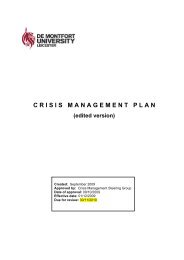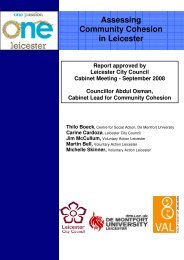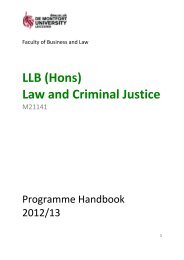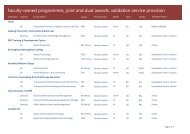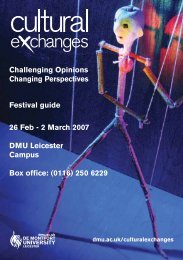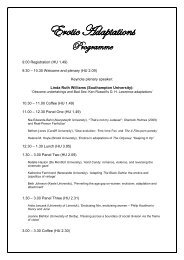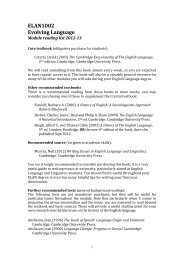Evaluation of the Crash Course March 2009 - De Montfort University
Evaluation of the Crash Course March 2009 - De Montfort University
Evaluation of the Crash Course March 2009 - De Montfort University
Create successful ePaper yourself
Turn your PDF publications into a flip-book with our unique Google optimized e-Paper software.
has also been suggested that risk-taking behaviour on <strong>the</strong> road may be deliberately<br />
sought as part <strong>of</strong> identity formation and in response to normative pressure from<br />
peers (e.g. Conner, Smith and McMillan, 2003). They may also assess risks taken<br />
whilst driving as acceptable in pursuit <strong>of</strong> o<strong>the</strong>r goals such as driving after drinking to<br />
meet a parental curfew (Harre, 2000). In o<strong>the</strong>r words, risk taking can be<br />
instrumental: a means to an end.<br />
Harre (2000) suggests that peer-resistance skills might be most effective at<br />
addressing <strong>the</strong>se issues and modifying risky behaviour but <strong>the</strong>re remains <strong>the</strong><br />
problem <strong>of</strong> risk-seeking in itself being perceived as pleasurable and “propped up with<br />
an entire social system <strong>of</strong> norms and media images that equate fast driving and<br />
‘skilful’ manoeuvres with masculinity, adulthood, and peer group approval” (Harre,<br />
2000; p.218). This type <strong>of</strong> deliberate risk-seeking has received less research than<br />
<strong>the</strong> o<strong>the</strong>r issue discussed, and it seems likely it will also be <strong>the</strong> most challenging to<br />
shift in adolescent road-users (Harre, 2000).<br />
3.2 Attitude change and young people<br />
A key set <strong>of</strong> questions to address when seeking to change behaviours such as risktaking<br />
on <strong>the</strong> roads through changing attitudes is whe<strong>the</strong>r such attitude change will<br />
actually be represented in changed behaviour and if so which attitudes predict which<br />
behaviours. This is a far from straightforward issue. As Glassman and Albarracin<br />
(2006) point out, social psychologists have for decades noted that “<strong>the</strong>re is<br />
considerable variability in <strong>the</strong> degree to which attitudes predict behavior” (p.778).<br />
However, Glassman and Albarracin go on to outline a number <strong>of</strong> characteristics <strong>of</strong><br />
attitudes that lead <strong>the</strong>m to be more predictive <strong>of</strong> behaviour. Attitudes are most likely<br />
to influence actual behaviour when <strong>the</strong>y are:<br />
• Held with confidence<br />
• Consistent<br />
• Easily recalled<br />
• Personally relevant<br />
• Reported frequently<br />
• Based on direct experience<br />
• Associated with behavioural information<br />
• Formed with a high motivation to think about <strong>the</strong> attitude object<br />
(Glassman and Albarracin, 2006)<br />
Relevant to <strong>the</strong> <strong>Crash</strong> <strong>Course</strong> aims, it is also noted that ‘hedonically-oriented’<br />
behaviours – those associated with enjoyment, such as playing, or driving at speed<br />
as a thrill-seeking behaviour – tend to be affectively driven (Millar and Tesser, 1992;<br />
Millar and Millar, 1998; Glassman and Albarracin, 2006). That is, <strong>the</strong>y are associated<br />
with <strong>the</strong> affective or emotional component <strong>of</strong> attitudes to a greater degree than <strong>the</strong><br />
cognitive or informational component. This means that how people feel about <strong>the</strong><br />
relevant attitude-objects is likely to be more significant for <strong>the</strong>ir future behaviour than<br />
what <strong>the</strong>y know about <strong>the</strong>m. This <strong>the</strong>refore suggests <strong>the</strong> use <strong>of</strong> a strategy <strong>of</strong><br />
concentrating on feelings relating to attitude-objects during attempts to change<br />
people’s attitudes relating to hedonic behaviours.<br />
24



